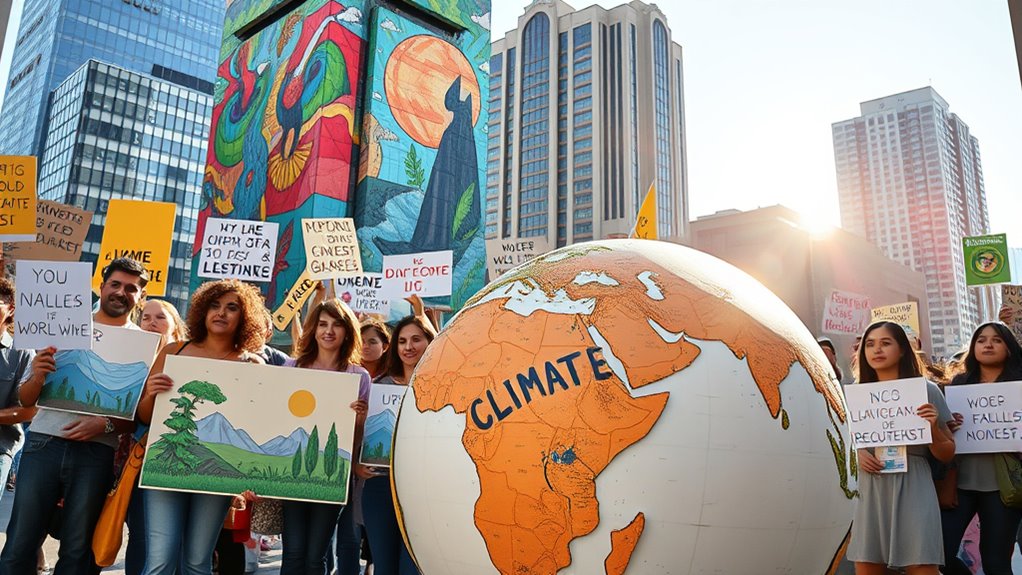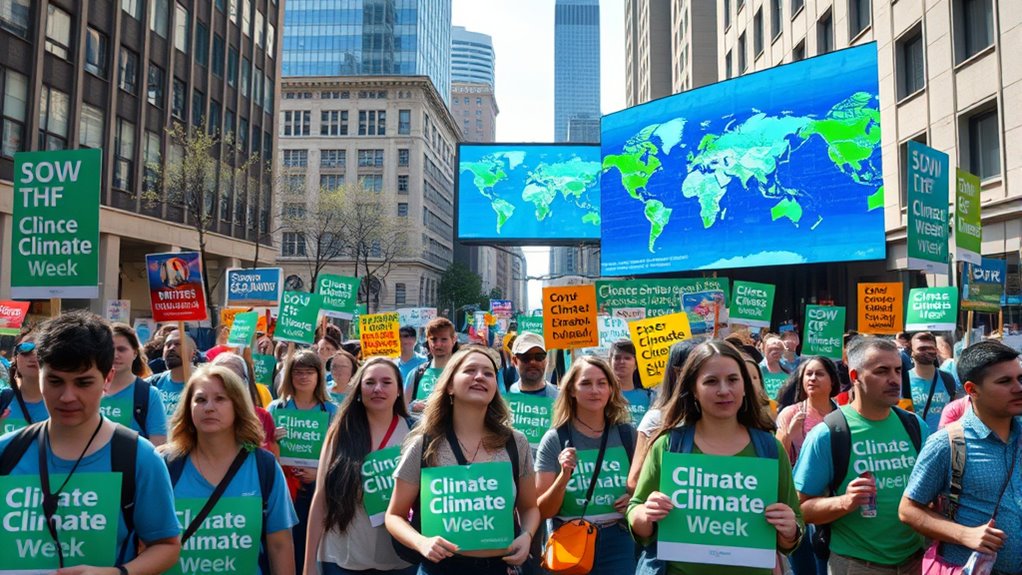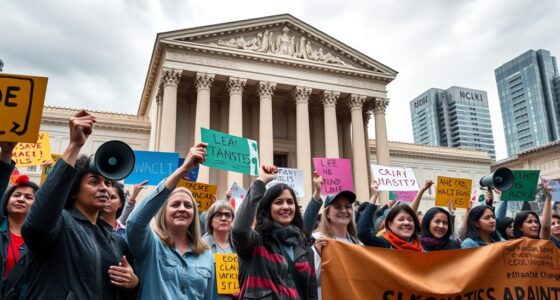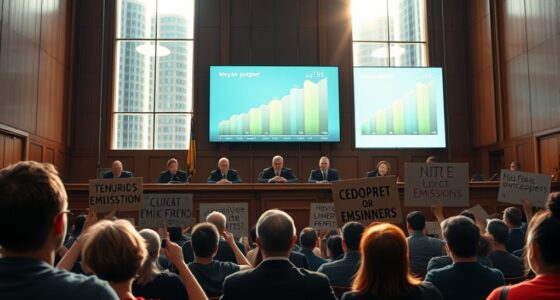During Climate Week, NGOs actively amplify the climate message worldwide by rallying young people, organizing impactful campaigns, and engaging communities. They shape policies behind the scenes and use social media to reach millions, supporting vulnerable communities along the way. Their efforts foster stronger advocacy, foster local ownership, and encourage global action. By understanding how these strategies work together, you’ll see how NGOs make a powerful difference—stay with us to explore these approaches in depth.
Key Takeaways
- NGOs organize global campaigns and events during Climate Week to raise awareness and mobilize action worldwide.
- Youth engagement initiatives amplify climate messages through social media, workshops, and grassroots activism.
- Strategic policy advocacy, backed by scientific data, influences government and corporate climate commitments.
- Collaboration with diverse stakeholders increases impact and fosters community-driven climate solutions.
- Cultural intelligence and community involvement ensure messaging resonates across different regions and populations.

Have you ever wondered how NGOs drive change during Climate Week? It’s because they harness the power of youth engagement and policy advocacy to push for meaningful action. During this pivotal time, NGOs rally young people, inspiring them to become active participants in climate conversations. They organize workshops, campaigns, and social media drives that empower youth to voice their concerns and ideas. This isn’t just about raising awareness; it’s about cultivating a new generation of climate leaders who understand their influence and are motivated to act. By engaging youth, NGOs create a ripple effect—young voices amplify the message, making it impossible for policymakers to ignore the urgency of climate action.
NGOs also excel at policy advocacy, strategically working behind the scenes to shape government and corporate responses to climate challenges. They prepare reports, hold meetings with decision-makers, and lobby for stronger policies that prioritize sustainability. During this period, their efforts are amplified through coordinated campaigns that leverage global outreach strategies. These efforts become even more visible, as NGOs organize high-profile events, panels, and campaigns aimed at influencing key stakeholders. They leverage the global platform to push for commitments to reduce emissions, protect ecosystems, and support vulnerable communities. This proactive approach guarantees that climate issues stay at the top of political agendas, translating public concern into concrete policy changes. Additionally, understanding the importance of scientific inquiry enables NGOs to base their advocacy on credible data, strengthening their influence. Incorporating data-driven strategies further enhances the effectiveness of their campaigns, ensuring that messaging is both compelling and grounded in facts.
You’ll notice that NGOs don’t work in isolation—they coordinate with governments, businesses, and communities to maximize impact. Their youth engagement initiatives often serve as entry points for broader policy advocacy, creating a pipeline of informed, passionate advocates who can hold leaders accountable. Through social media campaigns, they reach millions worldwide, mobilizing support and keeping pressure on policymakers. Additionally, incorporating Cultural Intelligence strategies enables NGOs to better understand and address diverse cultural contexts, increasing their effectiveness in global outreach efforts. Their ability to combine grassroots activism with strategic policy work makes them powerful catalysts during Climate Week. Recognizing the importance of community involvement further enhances their effectiveness by fostering local ownership of climate solutions.
Frequently Asked Questions
How Do NGOS Select Specific Climate Issues to Focus on During Climate Week?
During climate week, you’ll see NGOs selecting issues through careful issue prioritization, considering urgency and impact. They engage stakeholders—communities, experts, policymakers—to understand diverse perspectives and identify pressing needs. This collaborative process guarantees they focus on topics that resonate locally and globally, maximizing awareness and action. By aligning their efforts with stakeholder input, NGOs effectively highlight critical climate issues that demand immediate attention and resources.
What Strategies Do NGOS Use to Measure Their Impact During Climate Week Campaigns?
Think of impact assessment as your compass during climate week campaigns. You track progress through metrics like media reach, social media engagement, and policy influence. Stakeholder feedback acts as your guiding star, revealing how your message resonates. By combining quantitative data with qualitative insights, you can gauge your campaign’s effectiveness, refine your strategies, and make certain your efforts truly move the needle on climate action.
How Can Individuals Collaborate With NGOS Beyond Climate Week Events?
You can collaborate with NGOs beyond Climate Week by engaging in community activities and supporting their initiatives. Participate in local events, volunteer your time, and help spread awareness through digital advocacy on social media. Your involvement strengthens community engagement, making a bigger impact. By consistently sharing information and advocating online, you amplify the message and contribute to lasting change, extending the reach of climate action well beyond scheduled events.
What Challenges Do NGOS Face When Amplifying Messages on a Global Scale?
You face challenges like cultural barriers and language diversity when trying to amplify messages globally. These obstacles can hinder your ability to connect effectively with diverse audiences. You need to adapt your communication strategies, using culturally sensitive messaging and multilingual content. By doing so, you make your message more accessible, increasing awareness and engagement worldwide. Overcoming these challenges is essential for meaningful global impact and sustained support for your cause.
How Do NGOS Ensure Inclusivity and Representation in Their Climate Week Initiatives?
You guarantee inclusivity and representation in your Climate Week initiatives by prioritizing community engagement and practicing cultural sensitivity. You actively involve diverse voices, especially marginalized groups, to reflect a broad range of perspectives. By listening to community needs and respecting cultural differences, you create initiatives that resonate globally. This approach fosters trust, encourages participation, and ensures your message reaches and benefits everyone, making your efforts truly inclusive and impactful.
Conclusion
As you stand amidst the bustling crowds of Climate Week, you can see NGOs’ messages echoing across vibrant banners and spirited voices rising like waves. Their efforts paint a vivid mural of hope and urgency across the global landscape. With every handshake and shared idea, you’re part of a powerful movement—an unbreakable chain linking communities worldwide. Together, you’re shining a bright light on a sustainable future, guiding the world toward change that’s as unstoppable as the rising sun.









